|
|
By Sandy, on May 8th, 2009
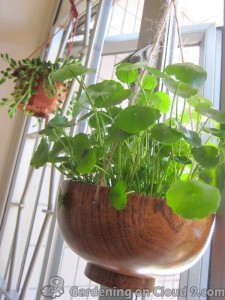 We know that good drainage is the key to healthy plants, but the containers that we find most attractive are often the ones without drainage holes. So, to broaden my choices of containers, I decided to go ahead and try to drill drainage holes in the containers by myself. We know that good drainage is the key to healthy plants, but the containers that we find most attractive are often the ones without drainage holes. So, to broaden my choices of containers, I decided to go ahead and try to drill drainage holes in the containers by myself.
Because this was my first time drilling drainage holes, I chose a wooden Japanese bowl as my container for I knew that it would be much easier to drill holes on wood than on glass. And as expected, this was so easy.
Continue reading How to Make Container Garden – Money Bowl
By Sandy, on February 26th, 2009
A few days ago, a friend asked me how often and how much should she water her plants when planting in crystal soil. I would say we should add water to the crystal beads whenever the beads shrink to around half of its size or to a size that cannot stably hold up the plants anymore.
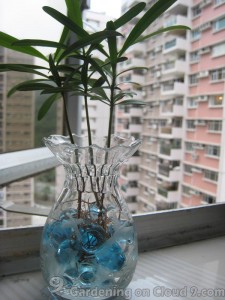
Continue reading Watering Plants in Crystal Soil
By Sandy, on February 19th, 2009
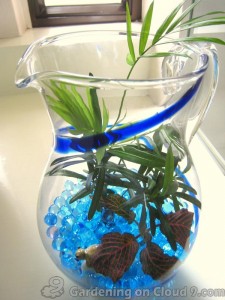
I realized the need to remake my tabletop garden – Ocean Breeze when I watered the garden for the first time after its making. I shouldn’t put the stones and marbles at the bottom of the container in the first place, at least, not so many of them.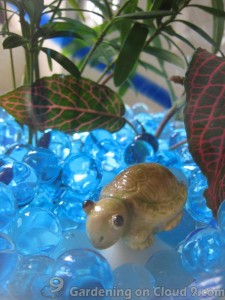
Originally, I put the stones and marbles there for three reasons.
Continue reading The Remake of Tabletop Garden – Ocean Breeze
By Sandy, on February 18th, 2009
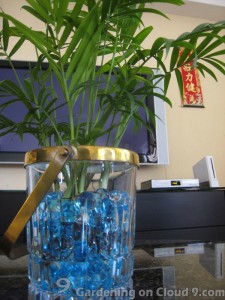 I have a friend asked me if she could plant her basil and mint in these colorful crystal soil beads. Although crystal soil is suitable for many indoor houseplants, especially foliage plants, I wouldn’t recommend my friend to plant her herbs in crystal soil. This is because while most herb plants love sunlight, crystal soil is not suitable to leave under direct sunlight for a long period of time. I have a friend asked me if she could plant her basil and mint in these colorful crystal soil beads. Although crystal soil is suitable for many indoor houseplants, especially foliage plants, I wouldn’t recommend my friend to plant her herbs in crystal soil. This is because while most herb plants love sunlight, crystal soil is not suitable to leave under direct sunlight for a long period of time.
But if you want to grow a plant that needs lots of sunlight with crystal soil, you can cover the crystal beads with a dark cloth to avoid them from drying out too quickly. However, this may have defeated the decoration purpose in the first place.
Many plants that thrive in crystal soil are hydroculture plants. For example, many foliage plants that like shade and humidity are the most suitable to grow in crystal soil or to root in water. And here are some examples.
Continue reading Suitable Plants for Crystal Soil & Hydroculture
By Sandy, on February 16th, 2009
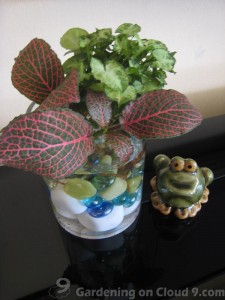 While there are complete hydroculture kits (with inner and outer pots, water level indicator, fertilizer and such) available in many shops, we can save the money, set up and grow plants in hydroculture by ourselves. While there are complete hydroculture kits (with inner and outer pots, water level indicator, fertilizer and such) available in many shops, we can save the money, set up and grow plants in hydroculture by ourselves.
Of course, the hydroculture kit can make your life easier in some degree, but, by ourselves, setting up one that doesn’t have a water level indicator, and using it to grow plants, isn’t rocket science either.
Here, let me show you how to pot plants in hydroculture.
Continue reading How to Pot Plants in Hydroculture
By Sandy, on January 31st, 2009
Hydroculture (a.k.a. passive hydroponics) is the practice of cultivating plants without the use of soil. Because of the ease of maintenance and its many other advantages over soil, it is a perfect way for indoor gardening.
So why is hydroculture so good?
Healthier
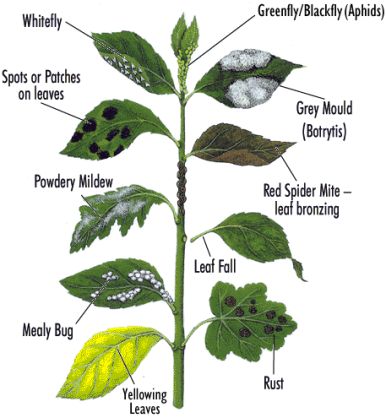
- Reduce allergy – no more spores, mold, mildew that are found in soil
- Pest free – no centipedes, sow bugs, worms or other soil pests
- Reduce odor
Continue reading Why is Hydroculture So Good?
By Sandy, on January 31st, 2009
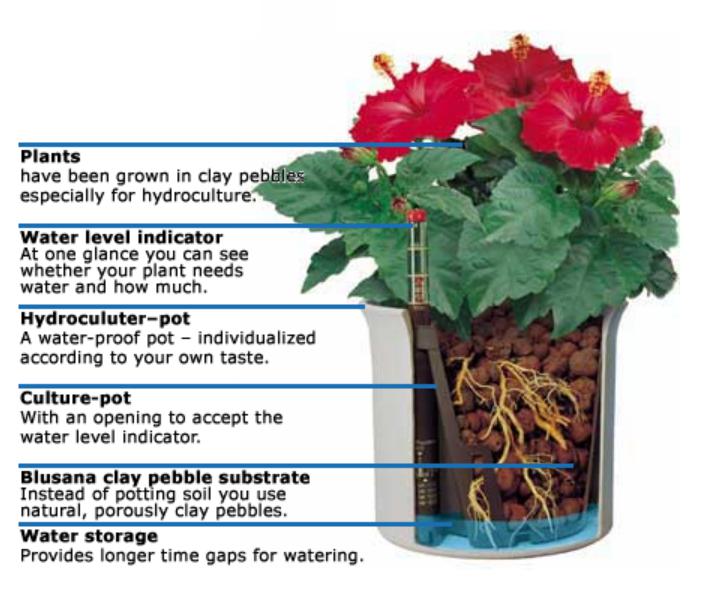 Here are the five main components of a hydroculture system. Here are the five main components of a hydroculture system.
Plant
Many houseplants can grow nicely in a hydrocultural environment.
Continue reading The 5 Components of Hydroculture Kit
By Sandy, on January 31st, 2009
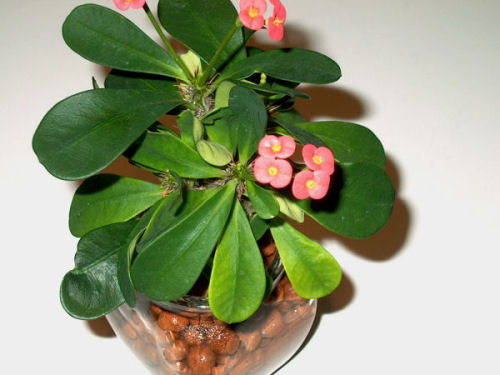 Sometimes, hydroculture is called the passive hydroponics. It is like the little brother of hydroponics – with smaller containers, simpler solution, and a cheaper and less complicated system. While hydroculture likes hydroponics, can be used for growing vegetables that we can buy in supermarkets, hydroculture is more for houseplants and for the fun of indoor gardening. Sometimes, hydroculture is called the passive hydroponics. It is like the little brother of hydroponics – with smaller containers, simpler solution, and a cheaper and less complicated system. While hydroculture likes hydroponics, can be used for growing vegetables that we can buy in supermarkets, hydroculture is more for houseplants and for the fun of indoor gardening.
Continue reading What is Hydroculture?
By Sandy, on January 31st, 2009
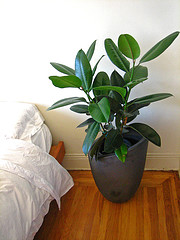 How long a plant lives in a water culture greatly depends on the water source. Water should keep fresh and nutritious, for plants need mineral nutrients to grow healthy. How long a plant lives in a water culture greatly depends on the water source. Water should keep fresh and nutritious, for plants need mineral nutrients to grow healthy.
When roots become deficient in mineral nutrients, particularly calcium and boron, which are required in the external solution for normal functioning of roots, the roots die and decay. Continue reading Watering Hydroculture Plants
By Sandy, on January 31st, 2009
Hydroculture plants are houseplants that grown in water, and the roots of these plants are called water roots. Water Roots differ from soil-grown roots. Water roots often seem to be more brittle than soil-grown ones. This may due to the bigger aerenchyma – the airy tissue found in roots of plants that allows exchange . . . → Read More: Hydroculture – Water Roots vs Soil-Grown Roots
|
|
 We know that good drainage is the key to healthy plants, but the containers that we find most attractive are often the ones without drainage holes. So, to broaden my choices of containers, I decided to go ahead and try to drill drainage holes in the containers by myself.
We know that good drainage is the key to healthy plants, but the containers that we find most attractive are often the ones without drainage holes. So, to broaden my choices of containers, I decided to go ahead and try to drill drainage holes in the containers by myself.






 Sometimes, hydroculture is called the passive hydroponics. It is like the little brother of hydroponics – with smaller containers, simpler solution, and a cheaper and less complicated system. While hydroculture likes hydroponics, can be used for growing vegetables that we can buy in supermarkets, hydroculture is more for houseplants and for the fun of indoor gardening.
Sometimes, hydroculture is called the passive hydroponics. It is like the little brother of hydroponics – with smaller containers, simpler solution, and a cheaper and less complicated system. While hydroculture likes hydroponics, can be used for growing vegetables that we can buy in supermarkets, hydroculture is more for houseplants and for the fun of indoor gardening. How long a plant lives in a water culture greatly depends on the water source. Water should keep fresh and nutritious, for plants need mineral nutrients to grow healthy.
How long a plant lives in a water culture greatly depends on the water source. Water should keep fresh and nutritious, for plants need mineral nutrients to grow healthy.


Recent Comments